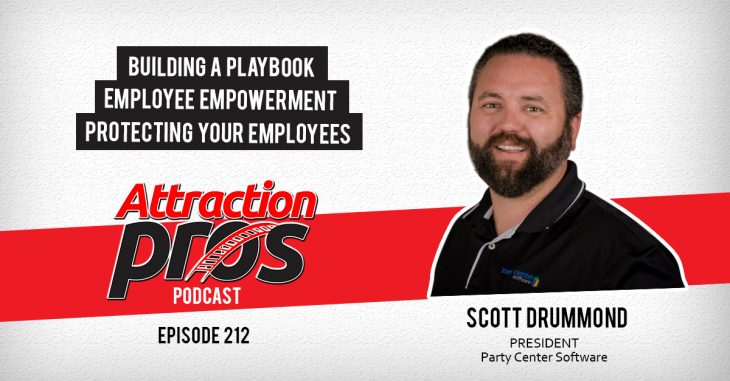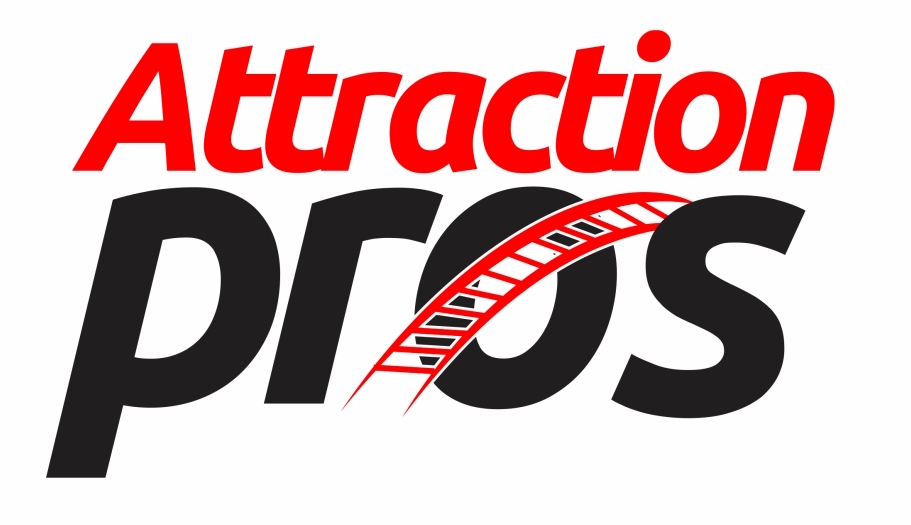
Episode 212 – Scott Drummond talks about building a playbook, employee empowerment, and protecting your employees
Scott Drummond is the President of Party Center Software. After Scott purchased a children’s entertainment center in the late 1990’s, he identified a gap in organizing birthday parties for easy scheduling. Identifying a need for his business, his frustration led to the creation of Party Center Software, which helps FEC guests book birthday parties online and helps the business keep tabs on the bookings. In this interview, Scott discusses the importance of building a playbook, employee empowerment, and protecting your employees.
Building a Playbook
“Everybody has a playbook, but most people just put it in their head.”
When somebody walks in the door, how do you greet them? What about greeting a party? Do you hold a sign with the guest’s name and greet them verbally? These processes already exist in some fashion, but with employees constantly turning over, having a playbook allows you to formalize these processes so they can be passed from one generation of staff to the next.
Your playbook must address all aspects of your business, including food and beverage, booking a birthday party, diffusing escalation situations, and cleaning your restrooms. The playbook should list out everything you need to do and how you do it, and when something new pops up, the playbook is a living document that gets updated as necessary. The playbook that your business uses is unique to you; even your direct competitors are using a different playbook than yours.
When comparing a playbook to a standard operating procedure (SOP), the playbook is a document that emphasizes “this is how you do it” vs. “this is what you do.” They are generally specific to completing a specific task or resolving a specific problem, which makes it easier for anyone to understand, especially for frontline staff members. SOP’s are also usually more set in stone, whereas a playbook should be updated as new issues or challenges arise. Your employees should have influence in the playbook’s continual evolution, especially as external trends and factors also evolve.
Employee Empowerment
“You have to be able to give them a little bit of rope, and let them fail.”
When your employees are challenged to be a part of the solution, their empowerment leads not only to higher levels of satisfaction, but also enhances the success of the business. When you invest in educational experiences, even if they result in failure, they are likely to lead to higher levels of success with new ideas down the road. Fostering a culture of empowerment may lead to many ideas that ultimately don’t work, yet the ideas that do work provide benefits that may not have otherwise been generated, and the magnitude of the successes outweigh the magnitude of the failures.
Empowerment is more than simply saying that your employees are empowered. Many businesses claim that they empower their employees, but they don’t walk the walk. Leaders should let employees make the decisions that they feel will be the best solution for the circumstance. Scott reinforces this point by sharing an instance when he suggested a solution to a staff member for recovering from a service failure, whereas the employee suggested a different solution. When Scott gave the employee the opportunity to take the credit for the recovery, the employee’s solution ultimately led to a high level of satisfaction. In other instances where the employee’s actions might misalign with the leader’s, it is better to have the conversation after the fact to determine the best action in the future, rather than stopping the employee from making the decision in the first place.
Protecting Your Employees
“I don’t take kindly to people yelling at my staff.”
It doesn’t happen often, but when a guest is being unruly, or parents are not stopping their children from being disruptive (or biting), sometimes the best solution is to ask a guest to never come back. There is always a threshold of abuse that employees will take from guests; however, in the event of repeat offenders or abusive guests, Scott stresses the importance of not allowing guests to be abusive to his employees. Despite the revenue lost from the guest, the employee is far more expensive to replace than the guest – even up to 50 times. The lifetime value of your employees far exceeds the lifetime value of your guests.
Even in some of the worst of circumstances, a brief intervention from the leader to help calm a guest down may diffuse the situation, and then the control and empowerment can be turned back to the employee. The employee must know that they are protected and have authority, especially when the leader is standing with them side-by-side.
To learn more about Party Center Software, including PCS Academy, visit the Party Center Software website.
This podcast wouldn’t be possible without the incredible work of our amazing team:
- Audio and video editing by Abigail Giganan
- Scheduling and correspondence by Kristen Karaliunas
- Social media marketing by Kate Kujawa
- Branding and design by Fabiana Fonseca
- Email marketing by Sam Bercik
To connect with AttractionPros: attractionpros@gmail.com
For audio only, click here:
Podcast: Play in new window | Download
